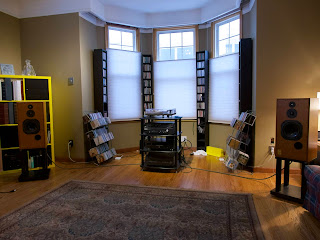The Art of Listening
 Have you ever thought that listening has many different colours? How many of us today say that we are good at multi-tasking? Marshall McLuhan, the great Canadian media guru, described television as a "cold" medium. As we became accustomed to watching television we also became used to a kind of passive reception of information. And I have to say, that despite all the apparently interactive aspects, many video games (though not all) leave the bulk of imaginative activity to the programmer and not the player.
Have you ever thought that listening has many different colours? How many of us today say that we are good at multi-tasking? Marshall McLuhan, the great Canadian media guru, described television as a "cold" medium. As we became accustomed to watching television we also became used to a kind of passive reception of information. And I have to say, that despite all the apparently interactive aspects, many video games (though not all) leave the bulk of imaginative activity to the programmer and not the player.For many centuries musical composers also wrote music that was to be half listened to. It is sometimes described as "incidental" music. It is music to eat dinner by, music to socialize with. I might even suggest that much of popular music listening is about having a shared social experience. There is much writing these days about how people relate to music. It does seem to be true that the music we listen to as adolescents tends to be the music we continue to listen to. What is playing in the background of our imaginations as we listen? Important life experiences and moments in our development might well have a musical association. But as we become adult, music shouldn't become something that merely helps us to reminisce.
I have always admired musicians who develop in their careers. There are also those groups of musicians who continue to pump out more of the same. I wonder how much of the way we listen to music is emblematic of the way we treat our life and relationships? It might be something to ponder.
For me, music is at its best when it is evocative, when it pulls out of me emotions and an appreciation of the non-verbal ways that we are disassembled and reassembled each day.
But for this deeper kind of listening to happen, I need patience. I need to listen at least sometimes when I am able to give the music my attention. I need to consciously let go of the other burdens of the day and relax.
One of the attractions that I have had over the years to classical music is that so much of it is layered and provides a rich emotional story-telling quality that becomes a workout for the mind, emotions and spirit. After such an experience, I am refreshed and ready to look at the world with fresh eyes. Symphonies and concertos (symphonic pieces written to feature a solo instrument) have been my favourites in this kind of listening.
 I have also found sometimes that a piece of music I thought I would like has turned out to be flat the first time around. I might pick up that recording months or even years later and suddenly it is speaking to me. In our 99 cent download (the return of the single) era, the idea of listening to a whole album is not very popular. Hang on to the album and listen to more of it months or even years from now. Maybe it will be different. The album invites us to give ourselves over to the music. I think that's the advantage of listening to the radio as well. A life where we had to intentionally control every aspect would eventually be degrading, limited by our own imaginations and not stretched enough.
I have also found sometimes that a piece of music I thought I would like has turned out to be flat the first time around. I might pick up that recording months or even years later and suddenly it is speaking to me. In our 99 cent download (the return of the single) era, the idea of listening to a whole album is not very popular. Hang on to the album and listen to more of it months or even years from now. Maybe it will be different. The album invites us to give ourselves over to the music. I think that's the advantage of listening to the radio as well. A life where we had to intentionally control every aspect would eventually be degrading, limited by our own imaginations and not stretched enough.So whether you are listening to music or you are involved in the relationships of your daily life, you could benefit from reflecting on the kind and quality of listening that you are doing. It is true that what we need most is attention.

